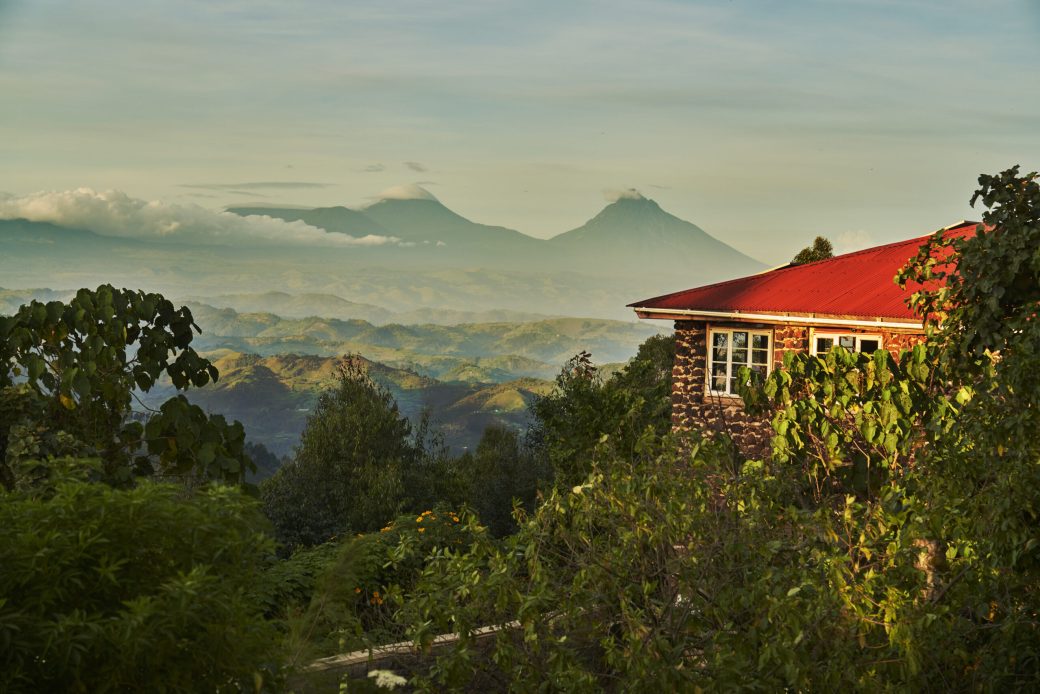The impossibly abundant rainforests of central Africa offer an extraordinary eco-friendly travel experience—encountering mountain gorillas hidden amidst the lush foliage. These remarkable creatures live in just three countries—Rwanda, the Democratic Republic of Congo, and Uganda—where complex family units navigate the dense bush, engaged in intricate social dynamics as they unknowingly battle for survival. If you’re an adventurer seeking an unforgettable experience, the chance to encounter mountain gorillas in their natural habitat is a must.
Back in 1993, the Uganda Wildlife Authority (UWA) initiated guided jungle expeditions, a visionary move aimed at safeguarding the gorillas and their mountainous forest from the encroachment of human activities such as habitat destruction, logging, mining, and poaching. Through raising awareness, garnering support, and offering exclusive encounters at a premium, the UWA achieved remarkable success. In 1981, the award-winning film “Gorillas in the Mist” brought Diane Fossey pioneering work with critically endangered gorillas to global attention, revealing that only 242 mountain gorillas existed in the wild. Fast forward to 2018, and the population had grown to 459; today, estimates suggest over 1000.
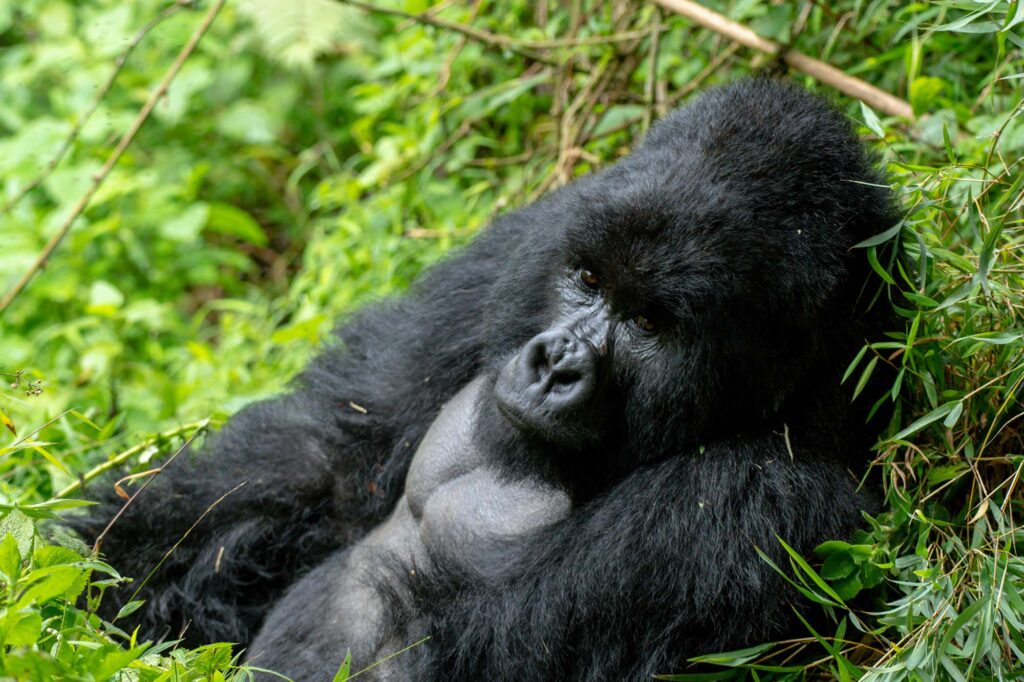
While the numbers are encouraging, the future of the mountain gorilla is by no means secure. And tourism remains the most powerful weapon in the conservation war. The focal point in Uganda is the Bwindi Impenetrable National Park in the southwestern rugged Rift Valley region, a protected region of mind-blowing biodiversity and home to half the world’s mountain gorilla population. Here in these impossibly wild highlands, Uganda’s great ape community meets tourists under the carefully curated eye of several safari operators, like Nkuringo Safaris.
Not far from Bwindi’s entrance, along a rugged red mud road, the bustling Bakiga town of Nkuringo sprouts, welcoming visitors from all corners of the earth. Its streets are lined with wonderfully named local stores (Gorilla Barber Shop), non-profit organizations like Nkuringo Community Conservation and Development Foundation (NCCDF), and for 17 years, Nkuringo Bwindi Gorilla Lodge, one of the pioneer accommodations for the gorilla ecotourism.
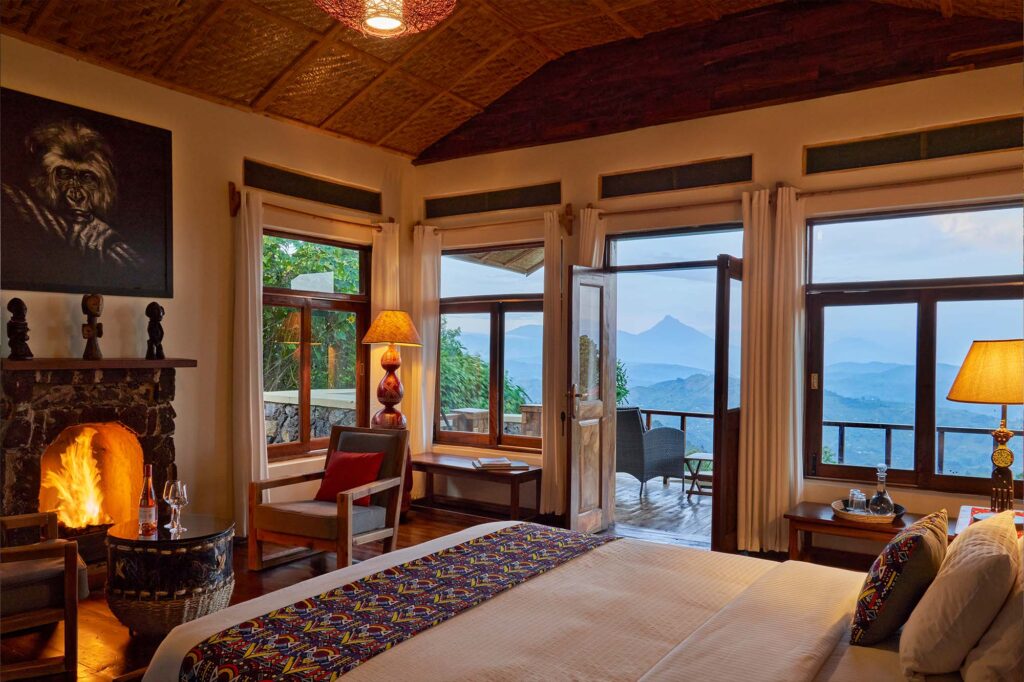
Nkuringo Bwindi Gorilla Lodge plays a significant role in this environment, not only for the gorillas but equally for the community. Among its many initiatives is a walking guide skilling partnership with local communities. Nkuringo Walking Safaris, an offshoot of the lodge, has proven instrumental in providing employment opportunities in gorilla tourism to locals and supporting children through the Nkuringo Junior Stars Program, with a focus on keeping girls in school while ensuring their parents earn sustainable livelihoods.
The lodge staff, too, locals young and older, are trained in hospitality, groundkeeping, guiding, and even massage to five-star standards. Necessary for such an impressive and luxurious property, priced and catering to well-off and one-off visitors on the trip of a lifetime.
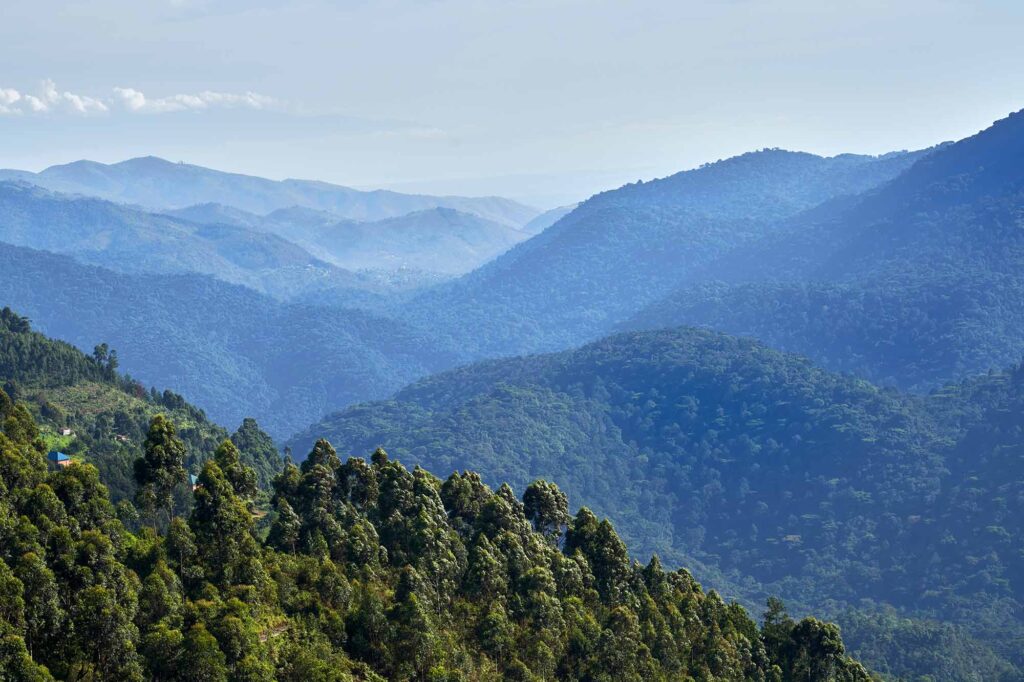
The lodge flows down the hillside towards Kashasha Valley below, affording dramatic views over the Bwindi forest canopy and tantalizing glimpses of what lies within. Its fifteen spacious forest cottages are scattered around the grounds, connected by wriggling walkways through bewitching flower gardens with trees and shrubs. A central hub serves as a dining room and social area, fire-lit, warm, and rugged, a closeting sanctuary against the wilds beyond its walls.
For all the effortless luxury and comfort the lodge affords, the thought of gorillas and the imminent jungle trek looms large over everything. Expeditions begin in the morning, and guests decked out in rain gear, gaiters, and walking sticks in an effort to soften the harsh edges of Bwindi’s impenetrable forest.
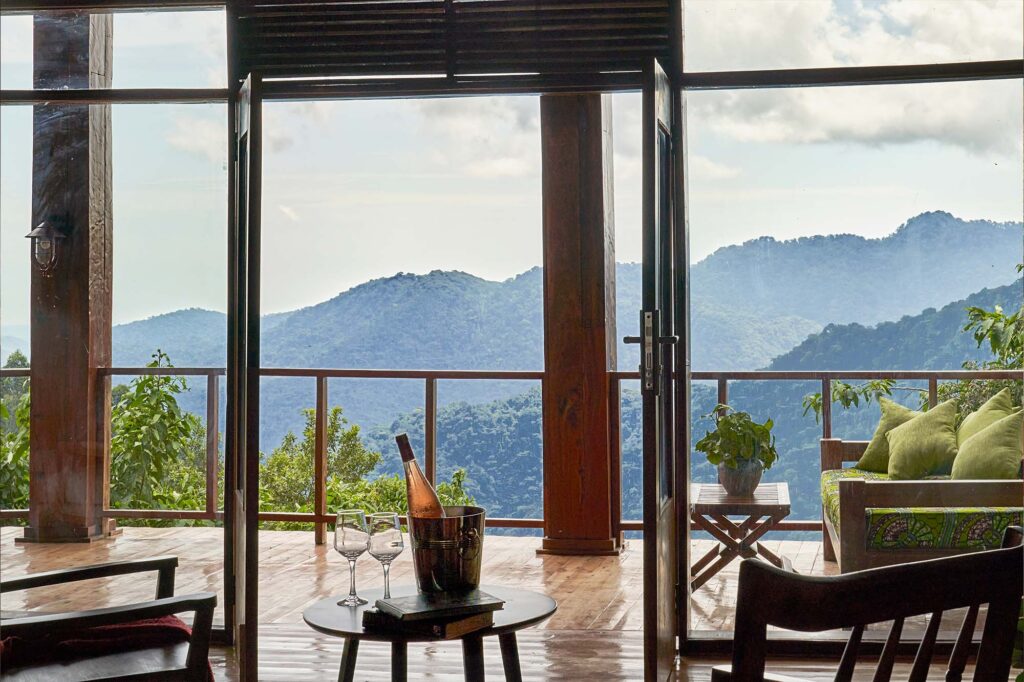
Access is via the misty covered dirt road through town—a ten-minute trundle to the park entrance for a briefing to meet our guides and find out which of the 23 habituated gorilla families (apes that aren’t tame, but that have become used to the presence of humans) that call Bwindi home well be searching out. With so many gorilla families, the rangers guarantee every expedition will be successful in its search, though there are no refunds if they’re not.
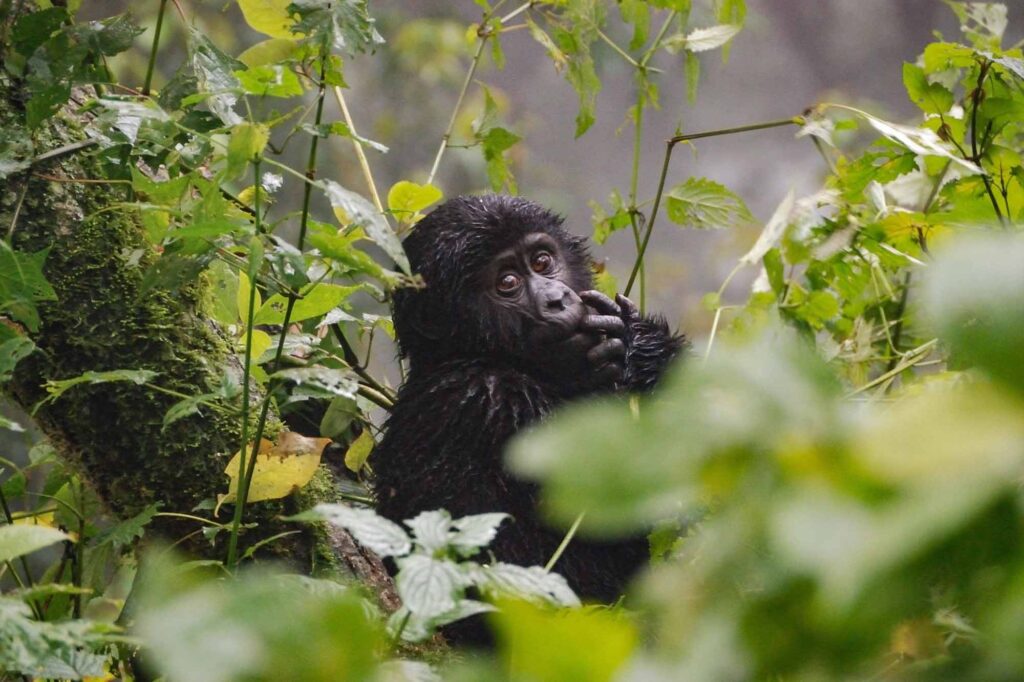
It’s a well-oiled operation. Trackers head out early in the morning to scout locations, constantly contacting guides to facilitate the search in what would otherwise be a needle-in-the-haystack scale exercise. Motoring up to the trailhead on the fringes of the primordial forest, anticipation is thick in the air. Landscapes roll and undulate to the horizon, vast plantations masking tiny communities betrayed only by the curl of smoke from cooking fires and the screeches of delight from children enthralled by our encroachment into their world.
Before the trek begins, each guest is assigned a porter to aid with packs. While it’s not mandatory, the role provides an important income source for local workers—and no matter how small your pack, once you’re toiling through the jungle, you’ll be glad not to carry the added weight. Completing the group are the advance trackers and escorts, usually hefting antique- looking AK-47s over their shoulders to ward off potential threats from forest elephants.
The forest lives up to its name. Trails are invisible to all but the trackers, who hack through the undergrowth, sweating in the fierce humidity, grateful for the canopy’s shade. Even as the environment saps our energy, the anticipation of what is to come re-energizes. This isn’t a fixed-distance trip, though, and every expedition is different in length, complexity, and challenge, determined only by the gorillas and where they happen to have settled that day.
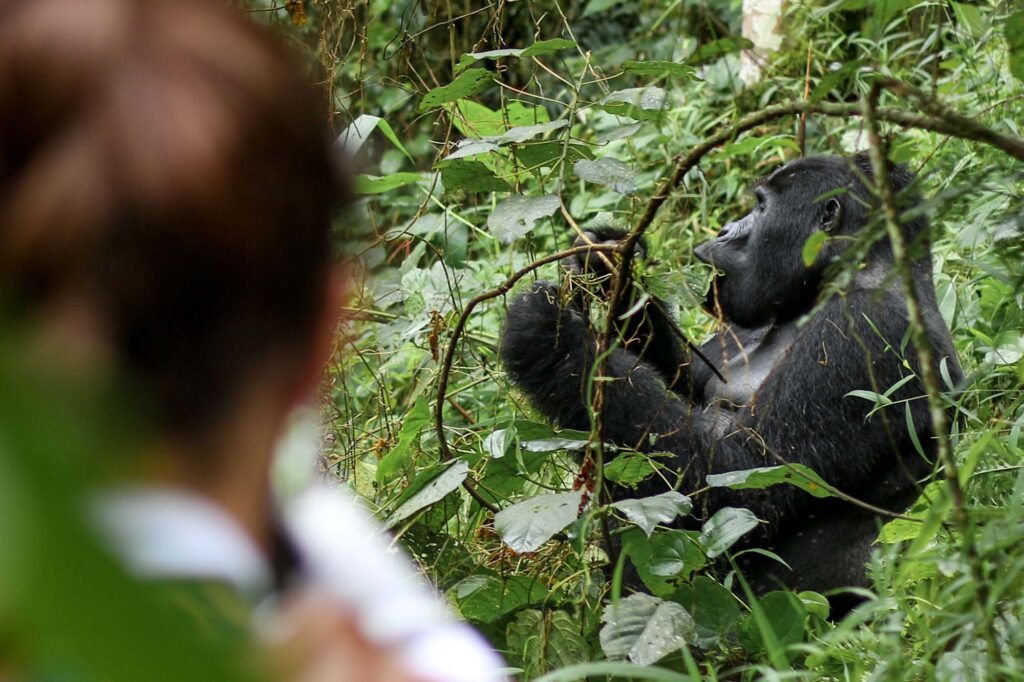
The payoff for the trek is worth every bead of sweat and aching muscle. Guides lower their voices to an urgent whisper, masks are donned to protect both gorillas and humans, and fingers point towards the black masses nestled amid the foliage. Even with masks, the pungent and unmistakable smell of the gorillas becomes apparent, though soon forgotten in the majesty of their presence.
Juveniles play, testing the boundaries of their environment and family’s patience. Mothers groom and fuss, tending to the entire family while munching on juicy leaves and shoots. Young males preen and pound their chests in a show of youthful bravado, and, calm among them all, the patriarch silverback. Seemingly oblivious to our presence, he radiates alpha male authority and calm, utterly at home in his role as protector, waving a massive, vaguely irritated arm at an overenthusiastic infant, playfully rolling onto his back in a show of jovial disapproval.
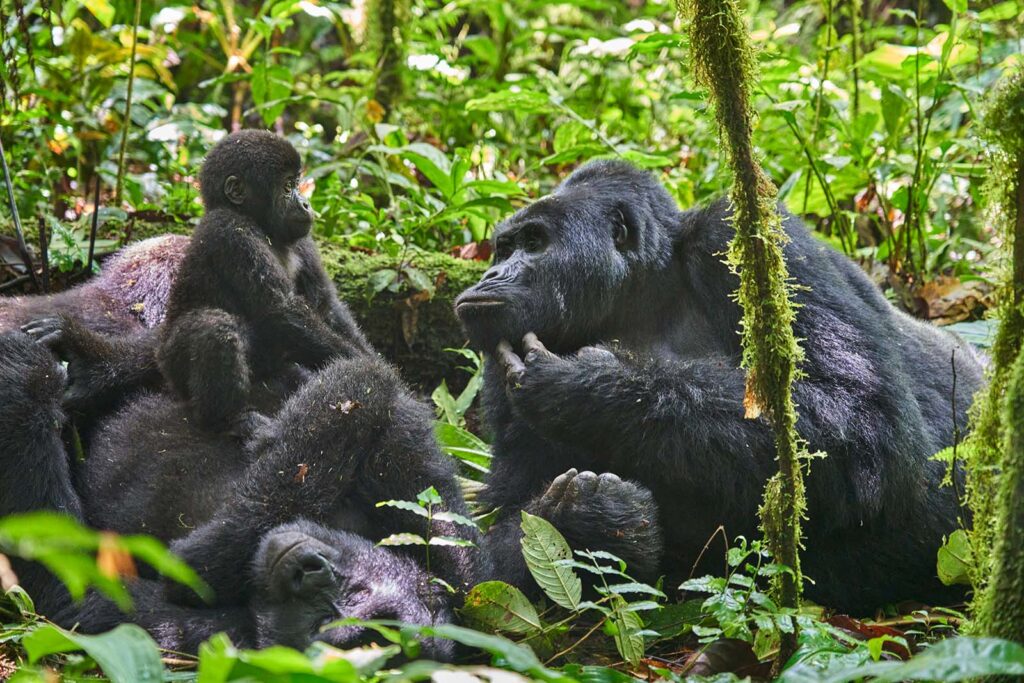
Even so, the presence of tourists is an imposition on their world. Visits are restricted to one hour,and the guides rightly impose strict distances. Initially, we assume this is to protect the sanctity of the gorillas until the silverback decides he’s had enough of us with a short, sharp charge in our general direction. A show of force, it is a powerful reminder of the transience of our place in his world and the value of his place in ours.
Nkuringo Safaris offers a 4-night full board stay at its Nkuringo Bwindi Gorilla Lodge, including a transit night in Entebbe, domestic flights and transport, one gorilla trek permit, and a $50 community project contribution from $2,716 per person in the high season. See offer details here.
.
Reservations: bwindi@nkuringolodges.com
Tel: +256 392 176327
WhatsApp: +256 787 778424

